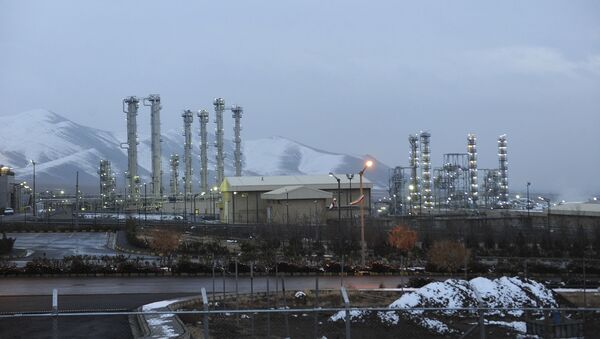Speaking at a televised news conference on Monday, Iranian Foreign Ministry spokesman Seyyed Abbas Mousavi stated that Tehran still adheres to the 2015 Iran nuclear deal, also known as the Joint Comprehensive Plan of Action (JCPOA).
“Tehran still remains in the deal ... the European powers' claims about Iran violating the deal are unfounded,” he pointed out.
Mousavi made it clear that “whether Iran will further decrease its nuclear commitments will depend on other parties and whether Iran's interests are secured under the deal”.
He also blamed European countries for their failure to fulfil their JCPOA obligations.
European Signatories Launch JCPOA's Dispute Resolution Mechanism
The statement comes after France, the UK and Germany issued a joint statement last Tuesday indicating that they had been "left with no choice, given Iran's actions", but to refer Iran's alleged failure to meet its commitments under the JCPOA to the Joint Commission under the treaty's Dispute Resolution Mechanism.
It stipulates that if the party accused of failing to live up to its JCPOA commitments does not resolve the complaint against it, the party or parties that triggered the mechanism can cease their own JCPOA obligations, notify the UN Security Council, or both.
The UN Security Council will then be given 30 days to approve a resolution to continue the lifting of sanctions against Iran. If it fails to do so, the sanctions which existed prior to the approval of Security Council Resolution 2231 will snap into place automatically.
The Russian Foreign Ministry, for its part, urged the European parties to the Iran nuclear deal “not to inflame tensions and to abandon any steps which call the prospects of the nuclear deal's future into question”.
The ministry noted that Moscow remains committed to the deal's "systematic" and "comprehensive" implementation, in accordance with the terms agreed upon in 2015 and as enshrined by UN Security Council Resolution 2231 on the Iran nuclear issue.
The statement was preceded by Iranian Foreign Minister Javad Zarif accusing France, the UK and Germany of "bowing to US diktat" on the nuclear deal, and reiterating that the European parties to the JCPOA could still save it, "but not by appeasing the bully and pressuring the complying party".
For 20 months, the E3-following UK appeasement policy-has bowed to US diktat.
— Javad Zarif (@JZarif) January 13, 2020
That hasn't gotten it anywhere-and it never will.
E3 can save JCPOA but not by appeasing the bully & pressuring the complying party
Rather it should muster the courage to fulfill its own obligations.
Iran Rolls Back Its JCPOA Commitments
Iran announced that it would be rolling back its commitments under the JCPOA last week, amid escalating tensions with Washington over the assassination of senior Iranian military commander Qasem Soleimani in Baghdad on 3 January.
Tehran noted that it would proceed to enrich uranium based on the technical requirements of its nuclear industry, but stressed that it would continue to cooperate with the IAEA. Iran's decision sparked concerns from the treaty's European signatories, and prompted US President Donald Trump to write an all-caps tweet stating that Iran would "NEVER" gain access to a nuclear weapon.
IRAN WILL NEVER HAVE A NUCLEAR WEAPON!
— Donald J. Trump (@realDonaldTrump) January 6, 2020
Iran began gradually reducing its commitments under the JCPOA in May 2019, one year after the US unilaterally pulled out of the treaty and slapped Tehran with tough energy and banking sanctions.
Since that time, Iran and the JCPOA's European signatories have attempted to negotiate tools with which Iran could be shielded from US sanctions, but these have proven insufficient.
The JCPOA was signed in 2015 by Iran, the United States, Russia, China, France, Germany, the United Kingdom and the European Union. The treaty provided Iran with sanctions relief in exchange for a commitment not to pursue nuclear weapons and to downgrade its uranium enrichment efforts.



